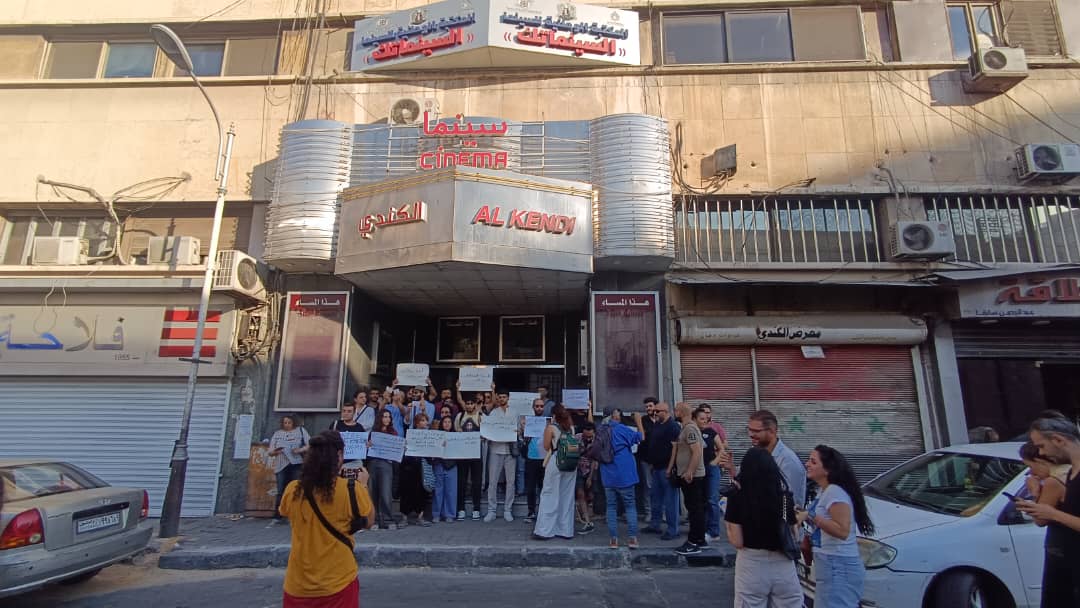Swedish director Ingmar Bergman once said, “Cinema is a dream you can hold in your hands.” But for Syrian cinephiles and filmmakers, that dream feels increasingly fragile. In the heart of Damascus—a city once pulsing with art and culture—the glow of the silver screen is dimming.
On Thursday, July 10, Syria’s Ministry of Religious Endowments (Awqaf) issued a decision to terminate the lease of the historic Kindi Cinema, demanding its evacuation within seven days. The justification: to repurpose the building into “a cultural center radiating knowledge and enlightenment for Syrian youth.” The decision triggered a storm of debate, especially as the lease price was reportedly just $30 a year for a space exceeding 700 square meters—a symbol, critics argue, of the government’s disregard for cultural heritage.
The announcement has not been accompanied by any official clarification from either the Ministry of Culture or the General Organization for Cinema, prompting confusion and protest among the public.
A Cinema Older Than the Regime Itself
Kindi Cinema is more than a movie theater; it is a cultural landmark. Dating back to the 1960s, it stands as one of the few remaining operational cinemas in Damascus. Once home to over 130 cinemas, the capital now has fewer than eight functioning venues—a sharp decline that began after the Ba’ath Party came to power and restricted film imports through the state-run film agency.
Originally founded by Lebanese trader Robert Sabbagh, the building was converted from a nightclub into the Adonis Theatre, later renamed Balkis Cinema, screening French and American films at affordable prices. In the 1970s, the General Organization for Cinema rented the building and renamed it Kindi Cinema. Since then, it has served as a hub for both commercial and artistic cinema, including children’s films, documentaries, and retrospectives. In the 1980s, the Ministry of Religious Endowments took ownership of the property, though the lease arrangement continued uninterrupted.
More Than a Cinema: Syria’s Only Cinematheque
Kindi Cinema also houses “Cinematheque Kindi”, a unique initiative dedicated to preserving rare and classic films for archival and educational purposes. The project supports film research and public screenings, aligning with international models followed by leading cinema institutions worldwide. Its closure would eliminate the only functioning cinematheque in Syria.
For decades, Kindi has offered low-cost screenings, supported local film clubs, and provided an open space for workshops and lectures—even during the war. Filmmaker and journalist Mirma Al-Wara’ noted that despite bureaucratic challenges, Kindi became a place where “we reshaped public space to fit our needs as artists and dreamers.”
Public Protests and Student Uprising
The decision sparked spontaneous protests in Damascus, including a rally organized by film student Miar Mhanna from the Higher Institute of Cinematic Arts. Speaking to Syria TV, Mhanna said the closure represents “the erasure of a vital page from Syria’s cinematic memory.”
“As a film student about to graduate, I need screening spaces to present my work,” she said. “This decision is not just a bureaucratic move—it’s a continuation of the old regime’s practice of stifling cultural life. It forces Syrian artists to take their work abroad, while denying them the ability to share it with their own people.”
Mhanna called for reopening shuttered cinemas, not closing more, arguing that Kindi was the spark that ignited a love for film among generations of Syrian youth.
Others voiced frustration online at the government’s wording that the site would now become “a center radiating knowledge.” Cultural journalist Ammar Al-Ma’moun asked, “Doesn’t cinema also radiate light—moving light, embodied thought, imagination?” He urged Syria’s youth to resist cultural erasure, warning that “if we remain silent, our protests will become funerals for cinema.”
A Divided Public and Legal Uncertainty
Not everyone opposes the decision. Supporters argue that the building belongs to the state and should be reclaimed, citing the symbolic $30 lease as a misuse of public resources. Still, critics note that both Kindi Cinema and the General Organization for Cinema are state institutions, and that the cinema has never been run for profit, but rather as a public cultural service.
Some opponents accused protestors of being “out of touch,” suggesting cinema is a luxury Syria cannot currently afford.
Legal experts disagree. Attorney Hussein Al-Rashid told Syria TV the Ministry of Endowments had no legal authority to unilaterally terminate the lease. Any eviction, he said, must be adjudicated by a court. The seven-day deadline, he argued, is unenforceable “unless the ministry intends to act above the law.”
The ministry has used similar tactics before. In previous years, it terminated leases in Tekkiye Suleimaniyah in coordination with the Ministry of Tourism under the former regime—raising concerns that the current transitional government may be replicating authoritarian practices it once condemned.
Response from the Cinema Authority
Two days after the controversy erupted, Jihad Abdo, director of the General Organization for Cinema, finally issued a public statement on his social media accounts. He expressed surprise at the decision and confirmed he was not notified through official channels.
Abdo said he had met with Culture Minister Mohammad Yassin Saleh, who expressed strong support for keeping the cinema open. Abdo reaffirmed his commitment to expanding Syria’s cinema scene, not contracting it, promising to increase film production and establish more screening venues.
“We will keep the public updated with developments,” he said, “and we hope to find a solution worthy of Kindi Cinema’s legacy and its place in the memory of generations of Syrians.”
This article was translated and edited by The Syrian Observer. The Syrian Observer has not verified the content of this story. Responsibility for the information and views set out in this article lies entirely with the author.


